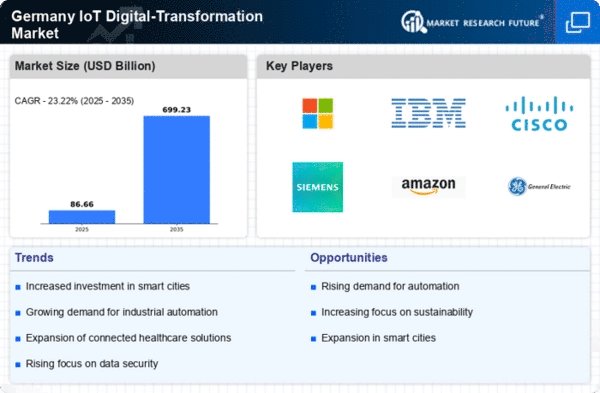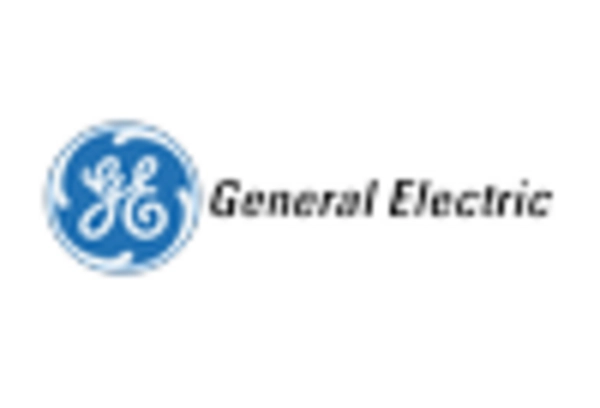Growing Focus on Sustainability
Sustainability has emerged as a pivotal driver for the iot digital-transformation market in Germany. Companies are increasingly recognizing the importance of reducing their carbon footprint and enhancing resource efficiency. IoT technologies enable organizations to monitor energy consumption and optimize resource allocation, which can lead to a reduction in waste by up to 25%. As a result, many German firms are integrating IoT solutions into their sustainability strategies. This trend not only aligns with consumer preferences but also complies with stringent environmental regulations. The emphasis on sustainability is likely to propel the iot digital-transformation market forward, as businesses seek innovative ways to meet their environmental goals.
Government Initiatives and Support
Government initiatives play a crucial role in shaping the iot digital-transformation market in Germany. The German government has launched various programs aimed at promoting digitalization across industries. For instance, the 'Digital Strategy 2025' aims to enhance the country's digital infrastructure and foster innovation. This initiative is expected to allocate over €1 billion towards IoT-related projects, thereby stimulating market growth. Furthermore, public-private partnerships are being encouraged to facilitate the development of IoT solutions. Such supportive measures indicate a favorable environment for the iot digital-transformation market, potentially leading to increased adoption rates among businesses.
Rising Demand for Smart Manufacturing
The market is experiencing a notable surge in demand for smart manufacturing solutions.. This trend is driven by the need for enhanced operational efficiency and productivity. According to recent data, approximately 70% of German manufacturers are investing in IoT technologies to optimize their production processes. The integration of IoT devices allows for real-time monitoring and predictive maintenance, which can reduce downtime by up to 30%. As industries increasingly adopt smart manufacturing practices, the iot digital-transformation market is poised for substantial growth, with projections indicating a potential market value exceeding €10 billion by 2026.
Advancements in Connectivity Technologies
The evolution of connectivity technologies is significantly impacting the iot digital-transformation market in Germany. The rollout of 5G networks is expected to enhance the performance and reliability of IoT applications. With 5G, data transmission speeds can increase by up to 100 times compared to previous generations, enabling real-time data processing and analysis. This advancement is particularly beneficial for sectors such as transportation and healthcare, where timely information is critical. As connectivity improves, the adoption of IoT solutions is likely to accelerate, thereby driving growth in the iot digital-transformation market. Market Research Future suggest that the market could expand by over 40% in the next five years due to these technological advancements.
Increased Consumer Demand for Smart Home Solutions
Consumer interest in smart home solutions is rapidly growing, which is influencing the iot digital-transformation market in Germany. A recent survey indicates that nearly 60% of German households are considering the adoption of smart home technologies, such as smart thermostats and security systems. This trend is driven by the desire for convenience, energy efficiency, and enhanced security. As more consumers embrace IoT-enabled devices, manufacturers are responding by developing innovative products tailored to this demand. Consequently, the iot digital-transformation market is likely to witness substantial growth, with projections estimating a market size of €5 billion by 2027, driven by the increasing penetration of smart home technologies.
















